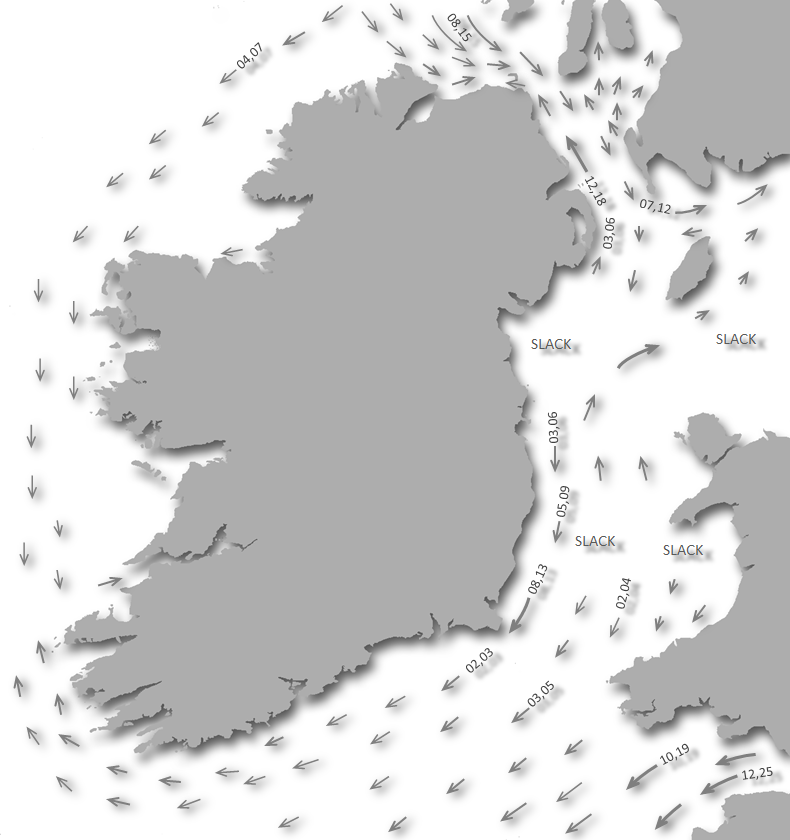

Cleggan affords tolerable shelter and straightforward access but with easterly winds the squalls are heavy off the hills.
Keyfacts for Cleggan Bay
Facilities








Nature



Considerations


Protected sectors
Approaches


Shelter


Last modified
May 30th 2017 Summary* Restrictions apply
A tolerable location with straightforward access.Facilities








Nature



Considerations


Position and approaches
Expand to new tab or fullscreen
Haven position
 53° 33.461' N, 010° 6.552' W
53° 33.461' N, 010° 6.552' Wthis is the position at the head of the quay at Cleggan
What is the initial fix?
The following Cleggan Bay initial fix will set up a final approach:
 53° 35.405' N, 010° 9.759' W
53° 35.405' N, 010° 9.759' W Not what you need?
Click the 'Next' and 'Previous' buttons to progress through neighbouring havens in a coastal 'clockwise' or 'anti-clockwise' sequence. Below are the ten nearest havens to Cleggan Bay for your convenience.
Ten nearest havens by straight line charted distance and bearing:
- Fahy Bay - 3.4 nautical miles E
- Ballynakill Harbour - 4.7 nautical miles E
- Clifden Boat Club - 4.8 nautical miles SSE
- Bofin Harbour - 4.9 nautical miles NW
- Clifden - 5.2 nautical miles SSE
- Mannin Bay - 6.2 nautical miles S
- Inishturk - 8.8 nautical miles N
- Bunowen Bay - 9.1 nautical miles S
- Little Killary Bay (Salrock) - 9.8 nautical miles ENE
- Roundstone Bay - 11.8 nautical miles SE
These havens are ordered by straight line charted distance and bearing, and can be reordered by compass direction or coastal sequence:
- Fahy Bay - 3.4 miles E
- Ballynakill Harbour - 4.7 miles E
- Clifden Boat Club - 4.8 miles SSE
- Bofin Harbour - 4.9 miles NW
- Clifden - 5.2 miles SSE
- Mannin Bay - 6.2 miles S
- Inishturk - 8.8 miles N
- Bunowen Bay - 9.1 miles S
- Little Killary Bay (Salrock) - 9.8 miles ENE
- Roundstone Bay - 11.8 miles SE
Chart
How to get in?
The entrance to the bay which is open to the northwest lies between the Aughrus and Cleggan promontories and is about 0.75 miles wide, and the bay extends inland for about 2 miles in a southeast direction. Cleggan Bay has easy access and is largely protected from the Atlantic swell by the off lying islands of Inishbofin and Inishshark, and it affords tolerable shelter especially during the summer sailing season, but with east winds the squalls are heavy off the surrounding hills.Anchorages can be taken in the outer part of the bay, or preferably in 6 to 7 metres depth abreast of the the quay at Cleggan village which lies 1.25 miles southeast of Cleggan Point on the south shore and about 0.5 miles from the head of the bay.
Why visit here?
At the head of Cleggan Bay lies the small sleepy fishing village of Cleggan, Irish : An Cloigeann, which means head or skull apparently referring to the coastal headland. Legend however provides a different origin of the name, St Ceannanach is said to have been beheaded by a pagan chief and folklore has it that the chief then picked up the head and took it to the Holy Well in Clooncree where he washed it before lying down to die. Cleggan is one of the most westerly points of Connemara and indeed Ireland, and it is situated approximately 7 miles northwest of Clifden and 9 miles to the west of Letterfrack. The village, which is sheltered by Cleggan Hill to the north, is the departure point for ferry services from the mainland to the islands of Inishbofin and Inishturk, and it is also the centre of the fishing industry in northwest Connemara.The outstanding feature of the landscape around Cleggan is the blanket bog, as Connemara and Ireland contain the last surviving blanket bogs in Europe. Few plant species can live in the acid conditions of the bog, but those that do form a vegetation not found outside of Ireland.
Traditionally fishing, supplemented by small farming has been the areas main source of income although latterly tourism makes a significant contribution. The islands of Inishbofin and Inishturk attract more and more visitors each year and the ferries to them leave Cleggan pier daily.
A focal point of Cleggan village is the pier which was built by the engineer Alexander Nimmo in 1822 and later extended in 1908, and from which tourists can hire boats for deep sea angling or trips to the islands.
In 1927 in what has become known as the Cleggan Disaster, 25 fishermen from the area drowned during a freak storm which arose whilst they were mackerel fishing in the bay.
The area between Cleggan and Ballynakill Lough has a fine collection of prehistoric monuments including tombs, standing stones and walls for those interested in archealogical finds, but for the more adventurous try taking a walk to Omey Island 7 miles southwest of Cleggan which can be reached on foot at low tide. The interior of the island is dominated by Fahy Lough but it also has some lovely long beaches on which pony races on the sand take place during August. It is truly a lovely island well worth visiting if in the area.
Cleggan beach on the Ballynew road is also the perfect location for an enjoyable walk along the sand or for a swim in the crystal clear waters, and it is also a great place for surfing. There are other notable walks in the area such as the walk to the summit of Cleggan Head where your reward will be a commanding view of the harbour and some breathtaking views including taking in the remains of Cleggan Tower, a signal tower built in 1816 when an invasion of Ireland by Napoleons' troops was feared.
Water is available at the pierhead at Cleggan and fuel can also be delivered to the pier by arrangement if a reasonable quantity is required, and the village boasts a small general store, a grocery shop, a post office, a restaurant and four bars. There is also a launching slip inside the boat harbour that has been built by the RNLI.
What facilities are available?
Water is available from a tap at Cleggan pierhead, and fuel can be delivered to the quay by arrangement if sufficient quantity is required. Cleggan village has a small general store, a grocery shop, a post office, a restaurant and four bars. A slipway is available inside the inner harbour.With thanks to:
inyourfootsteps.com site researchThe following video is an exert from the BBC Coast series highlighting Cleggan Harbour.
Add your review or comment:
Please log in to leave a review of this haven.
Please note eOceanic makes no guarantee of the validity of this information, we have not visited this haven and do not have first-hand experience to qualify the data. Although the contributors are vetted by peer review as practised authorities, they are in no way, whatsoever, responsible for the accuracy of their contributions. It is essential that you thoroughly check the accuracy and suitability for your vessel of any waypoints offered in any context plus the precision of your GPS. Any data provided on this page is entirely used at your own risk and you must read our legal page if you view data on this site. Free to use sea charts courtesy of Navionics.












